Organisational Behaviour Analysis: Deloitte's Performance
VerifiedAdded on 2022/12/28
|17
|5274
|63
Report
AI Summary
This report provides an analysis of organisational behaviour, focusing on the case of Deloitte. It examines how organisational culture, political dynamics, and power structures influence individual and team behaviour and performance. The report delves into the impact of power, including legitimate, reward, referent, informational, and expert power, and how they are utilized within the organisation. It also explores the negative impacts of workplace politics, such as decreased productivity and demotivation. Furthermore, the report evaluates content and process theories of motivation, including intrinsic and extrinsic motivation, and their application in achieving organisational goals. It also provides insights into what makes teams effective and ineffective, alongside different philosophies and concepts of organisational behaviour. The report aims to provide a comprehensive understanding of the factors that drive individual and team success within a large organisation like Deloitte.
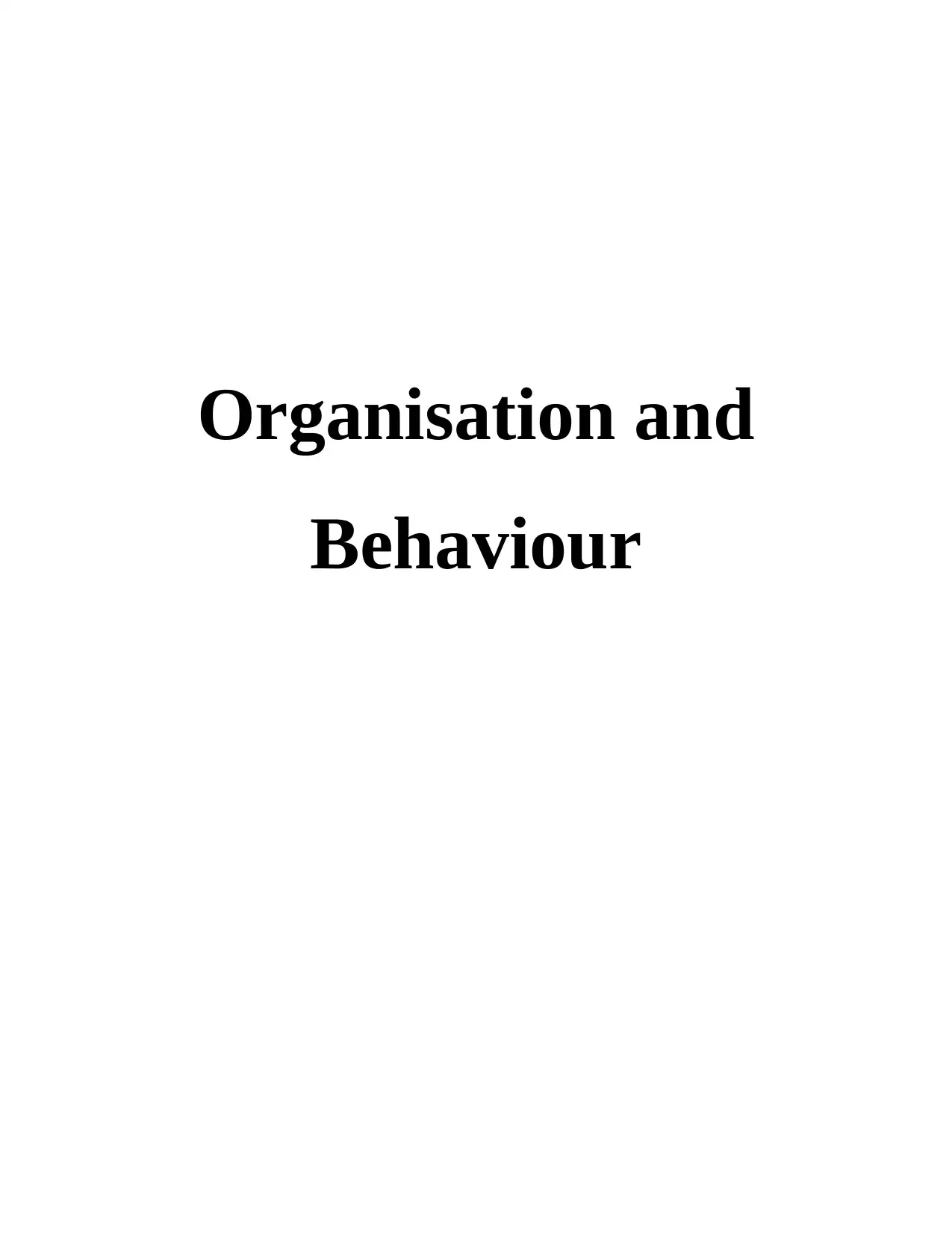
Organisation and
Behaviour
Behaviour
Paraphrase This Document
Need a fresh take? Get an instant paraphrase of this document with our AI Paraphraser
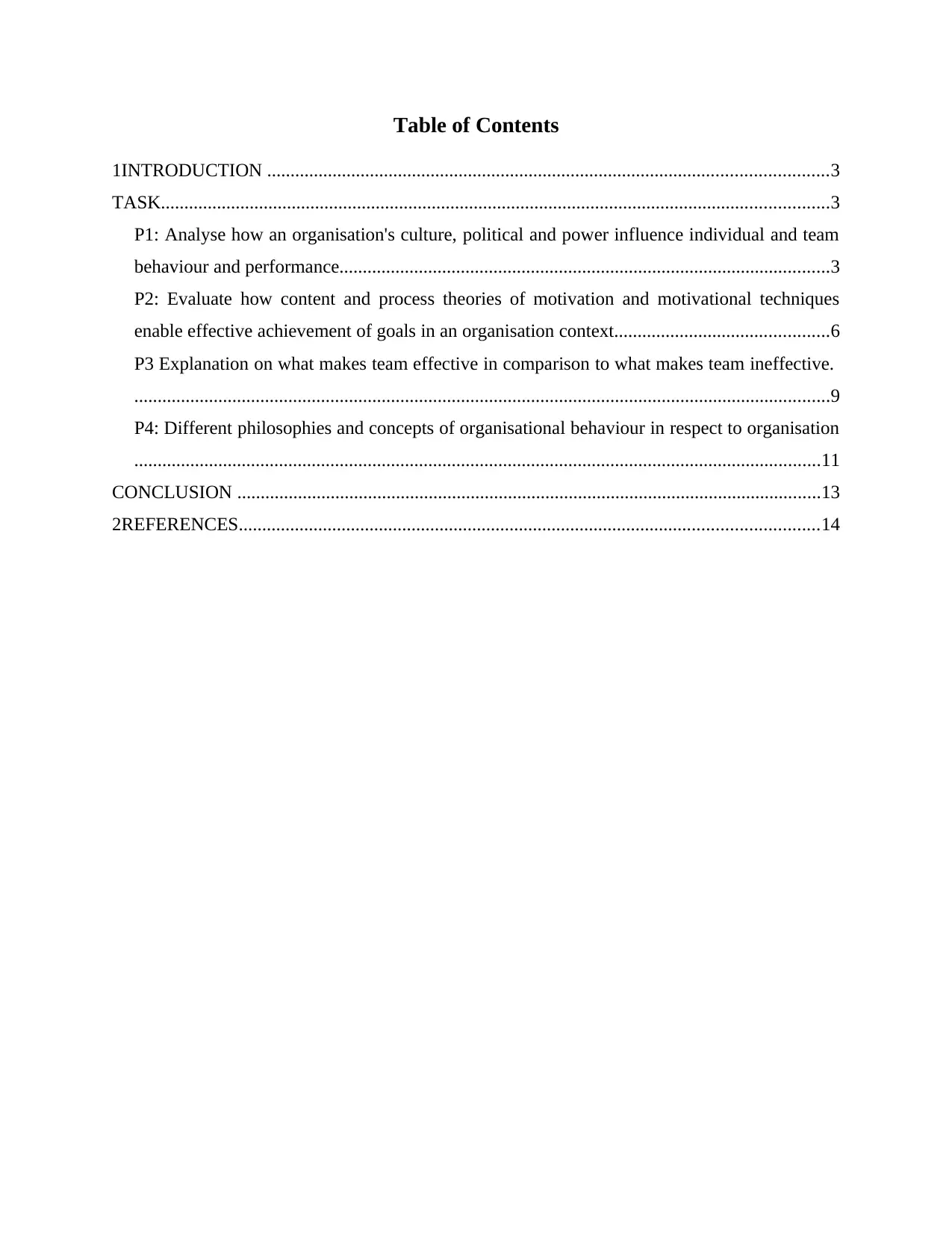
Table of Contents
1INTRODUCTION ........................................................................................................................3
TASK...............................................................................................................................................3
P1: Analyse how an organisation's culture, political and power influence individual and team
behaviour and performance.........................................................................................................3
P2: Evaluate how content and process theories of motivation and motivational techniques
enable effective achievement of goals in an organisation context..............................................6
P3 Explanation on what makes team effective in comparison to what makes team ineffective.
.....................................................................................................................................................9
P4: Different philosophies and concepts of organisational behaviour in respect to organisation
...................................................................................................................................................11
CONCLUSION .............................................................................................................................13
2REFERENCES............................................................................................................................14
1INTRODUCTION ........................................................................................................................3
TASK...............................................................................................................................................3
P1: Analyse how an organisation's culture, political and power influence individual and team
behaviour and performance.........................................................................................................3
P2: Evaluate how content and process theories of motivation and motivational techniques
enable effective achievement of goals in an organisation context..............................................6
P3 Explanation on what makes team effective in comparison to what makes team ineffective.
.....................................................................................................................................................9
P4: Different philosophies and concepts of organisational behaviour in respect to organisation
...................................................................................................................................................11
CONCLUSION .............................................................................................................................13
2REFERENCES............................................................................................................................14
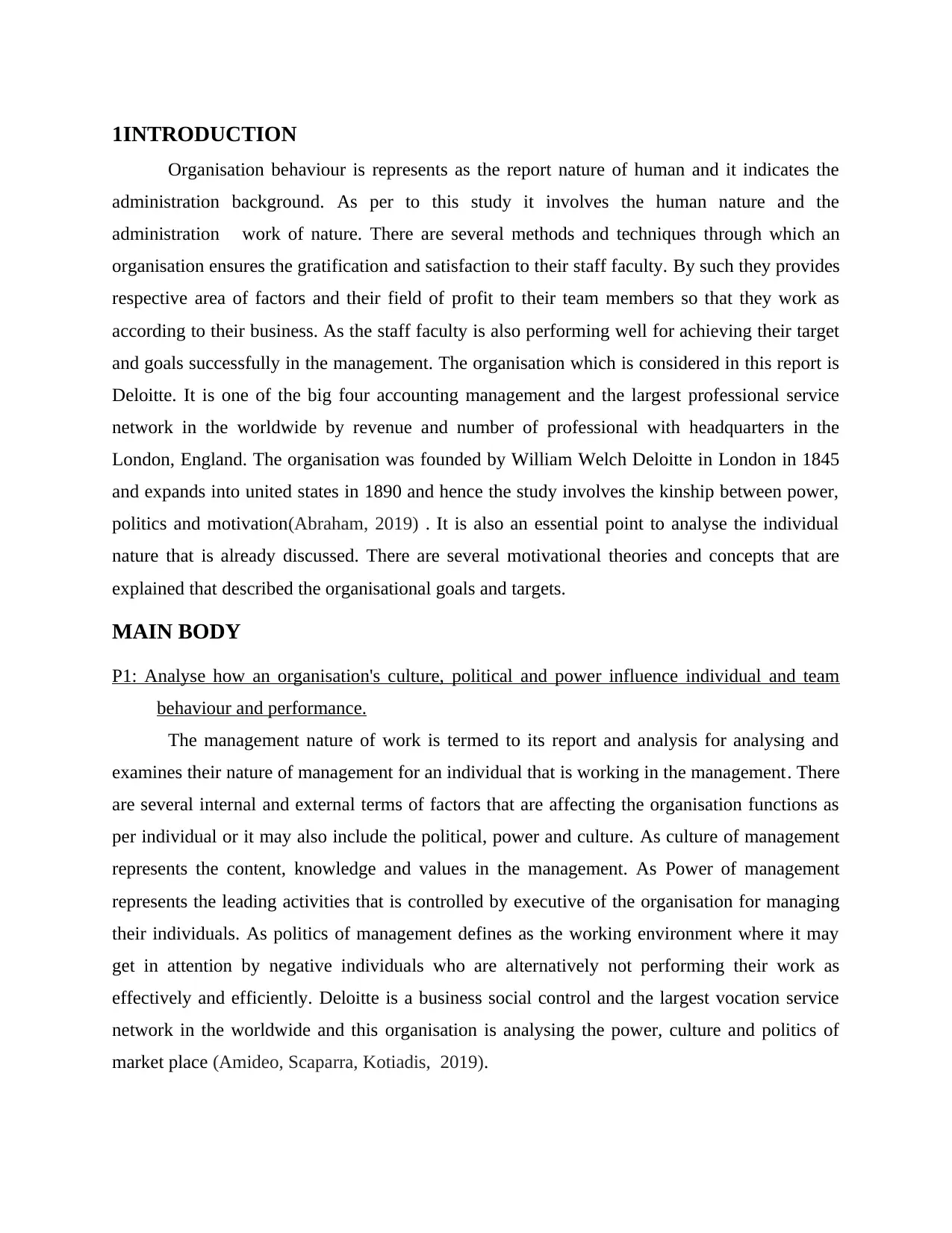
1INTRODUCTION
Organisation behaviour is represents as the report nature of human and it indicates the
administration background. As per to this study it involves the human nature and the
administration work of nature. There are several methods and techniques through which an
organisation ensures the gratification and satisfaction to their staff faculty. By such they provides
respective area of factors and their field of profit to their team members so that they work as
according to their business. As the staff faculty is also performing well for achieving their target
and goals successfully in the management. The organisation which is considered in this report is
Deloitte. It is one of the big four accounting management and the largest professional service
network in the worldwide by revenue and number of professional with headquarters in the
London, England. The organisation was founded by William Welch Deloitte in London in 1845
and expands into united states in 1890 and hence the study involves the kinship between power,
politics and motivation(Abraham, 2019) . It is also an essential point to analyse the individual
nature that is already discussed. There are several motivational theories and concepts that are
explained that described the organisational goals and targets.
MAIN BODY
P1: Analyse how an organisation's culture, political and power influence individual and team
behaviour and performance.
The management nature of work is termed to its report and analysis for analysing and
examines their nature of management for an individual that is working in the management. There
are several internal and external terms of factors that are affecting the organisation functions as
per individual or it may also include the political, power and culture. As culture of management
represents the content, knowledge and values in the management. As Power of management
represents the leading activities that is controlled by executive of the organisation for managing
their individuals. As politics of management defines as the working environment where it may
get in attention by negative individuals who are alternatively not performing their work as
effectively and efficiently. Deloitte is a business social control and the largest vocation service
network in the worldwide and this organisation is analysing the power, culture and politics of
market place (Amideo, Scaparra, Kotiadis, 2019).
Organisation behaviour is represents as the report nature of human and it indicates the
administration background. As per to this study it involves the human nature and the
administration work of nature. There are several methods and techniques through which an
organisation ensures the gratification and satisfaction to their staff faculty. By such they provides
respective area of factors and their field of profit to their team members so that they work as
according to their business. As the staff faculty is also performing well for achieving their target
and goals successfully in the management. The organisation which is considered in this report is
Deloitte. It is one of the big four accounting management and the largest professional service
network in the worldwide by revenue and number of professional with headquarters in the
London, England. The organisation was founded by William Welch Deloitte in London in 1845
and expands into united states in 1890 and hence the study involves the kinship between power,
politics and motivation(Abraham, 2019) . It is also an essential point to analyse the individual
nature that is already discussed. There are several motivational theories and concepts that are
explained that described the organisational goals and targets.
MAIN BODY
P1: Analyse how an organisation's culture, political and power influence individual and team
behaviour and performance.
The management nature of work is termed to its report and analysis for analysing and
examines their nature of management for an individual that is working in the management. There
are several internal and external terms of factors that are affecting the organisation functions as
per individual or it may also include the political, power and culture. As culture of management
represents the content, knowledge and values in the management. As Power of management
represents the leading activities that is controlled by executive of the organisation for managing
their individuals. As politics of management defines as the working environment where it may
get in attention by negative individuals who are alternatively not performing their work as
effectively and efficiently. Deloitte is a business social control and the largest vocation service
network in the worldwide and this organisation is analysing the power, culture and politics of
market place (Amideo, Scaparra, Kotiadis, 2019).
⊘ This is a preview!⊘
Do you want full access?
Subscribe today to unlock all pages.

Trusted by 1+ million students worldwide
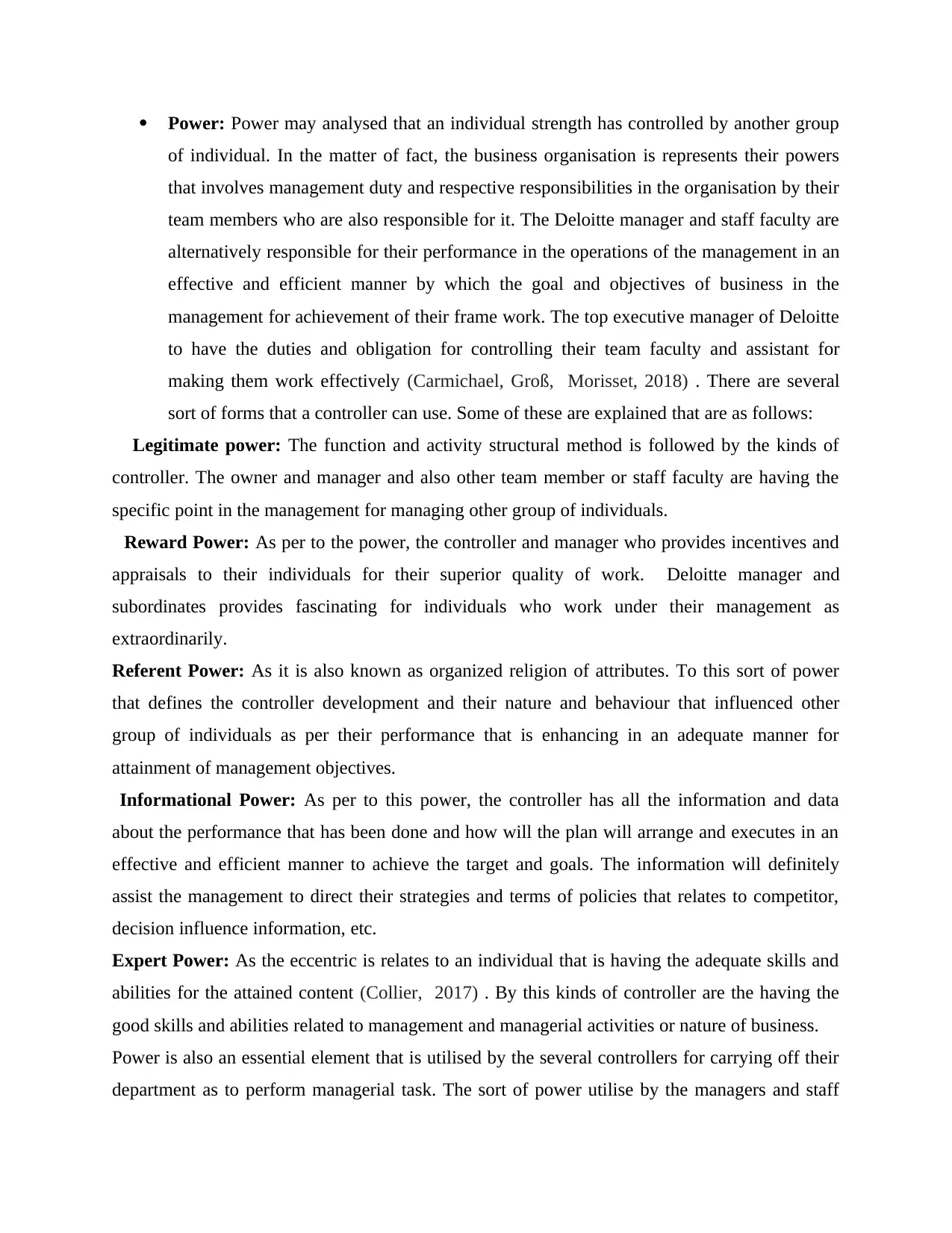
Power: Power may analysed that an individual strength has controlled by another group
of individual. In the matter of fact, the business organisation is represents their powers
that involves management duty and respective responsibilities in the organisation by their
team members who are also responsible for it. The Deloitte manager and staff faculty are
alternatively responsible for their performance in the operations of the management in an
effective and efficient manner by which the goal and objectives of business in the
management for achievement of their frame work. The top executive manager of Deloitte
to have the duties and obligation for controlling their team faculty and assistant for
making them work effectively (Carmichael, Groß, Morisset, 2018) . There are several
sort of forms that a controller can use. Some of these are explained that are as follows:
Legitimate power: The function and activity structural method is followed by the kinds of
controller. The owner and manager and also other team member or staff faculty are having the
specific point in the management for managing other group of individuals.
Reward Power: As per to the power, the controller and manager who provides incentives and
appraisals to their individuals for their superior quality of work. Deloitte manager and
subordinates provides fascinating for individuals who work under their management as
extraordinarily.
Referent Power: As it is also known as organized religion of attributes. To this sort of power
that defines the controller development and their nature and behaviour that influenced other
group of individuals as per their performance that is enhancing in an adequate manner for
attainment of management objectives.
Informational Power: As per to this power, the controller has all the information and data
about the performance that has been done and how will the plan will arrange and executes in an
effective and efficient manner to achieve the target and goals. The information will definitely
assist the management to direct their strategies and terms of policies that relates to competitor,
decision influence information, etc.
Expert Power: As the eccentric is relates to an individual that is having the adequate skills and
abilities for the attained content (Collier, 2017) . By this kinds of controller are the having the
good skills and abilities related to management and managerial activities or nature of business.
Power is also an essential element that is utilised by the several controllers for carrying off their
department as to perform managerial task. The sort of power utilise by the managers and staff
of individual. In the matter of fact, the business organisation is represents their powers
that involves management duty and respective responsibilities in the organisation by their
team members who are also responsible for it. The Deloitte manager and staff faculty are
alternatively responsible for their performance in the operations of the management in an
effective and efficient manner by which the goal and objectives of business in the
management for achievement of their frame work. The top executive manager of Deloitte
to have the duties and obligation for controlling their team faculty and assistant for
making them work effectively (Carmichael, Groß, Morisset, 2018) . There are several
sort of forms that a controller can use. Some of these are explained that are as follows:
Legitimate power: The function and activity structural method is followed by the kinds of
controller. The owner and manager and also other team member or staff faculty are having the
specific point in the management for managing other group of individuals.
Reward Power: As per to the power, the controller and manager who provides incentives and
appraisals to their individuals for their superior quality of work. Deloitte manager and
subordinates provides fascinating for individuals who work under their management as
extraordinarily.
Referent Power: As it is also known as organized religion of attributes. To this sort of power
that defines the controller development and their nature and behaviour that influenced other
group of individuals as per their performance that is enhancing in an adequate manner for
attainment of management objectives.
Informational Power: As per to this power, the controller has all the information and data
about the performance that has been done and how will the plan will arrange and executes in an
effective and efficient manner to achieve the target and goals. The information will definitely
assist the management to direct their strategies and terms of policies that relates to competitor,
decision influence information, etc.
Expert Power: As the eccentric is relates to an individual that is having the adequate skills and
abilities for the attained content (Collier, 2017) . By this kinds of controller are the having the
good skills and abilities related to management and managerial activities or nature of business.
Power is also an essential element that is utilised by the several controllers for carrying off their
department as to perform managerial task. The sort of power utilise by the managers and staff
Paraphrase This Document
Need a fresh take? Get an instant paraphrase of this document with our AI Paraphraser
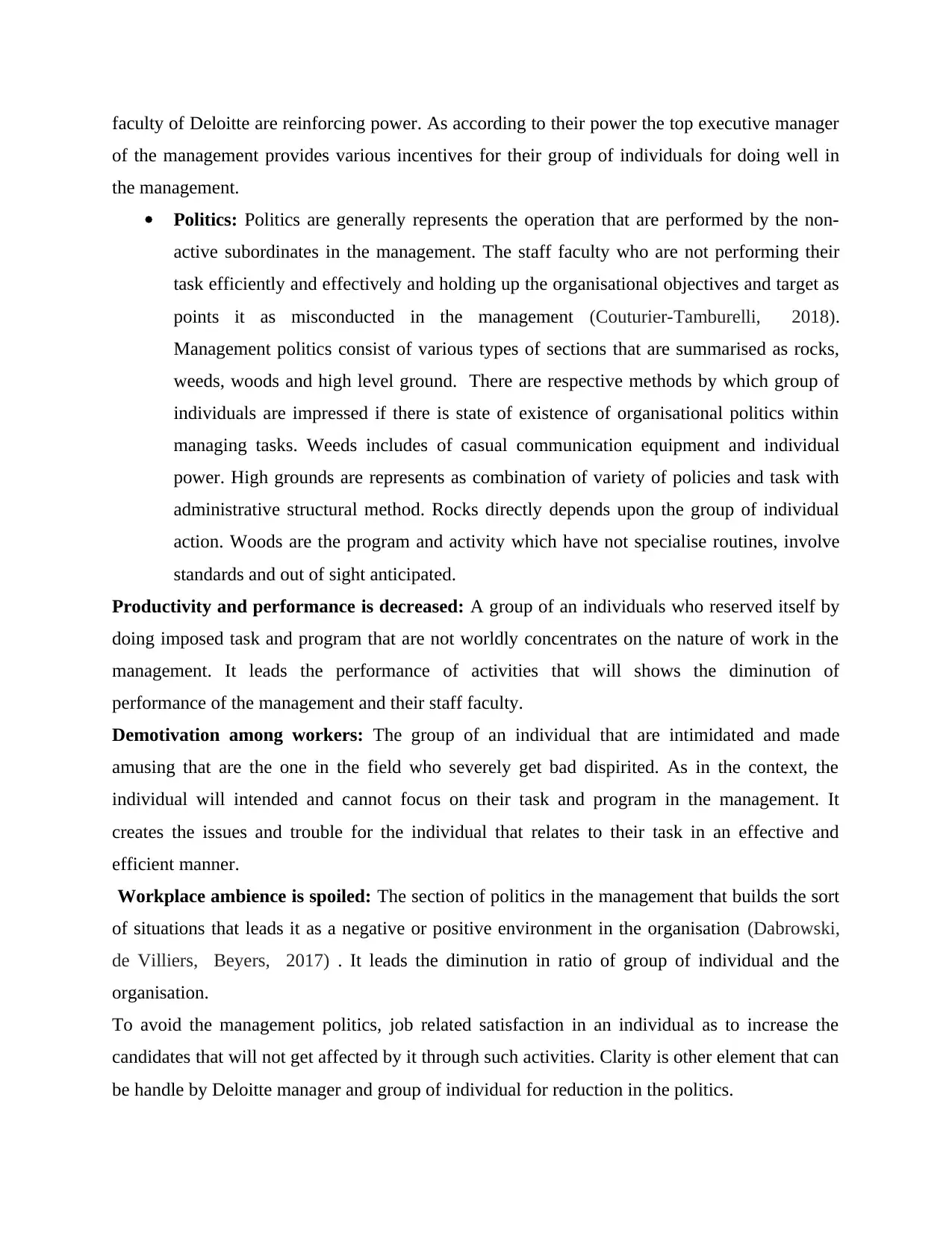
faculty of Deloitte are reinforcing power. As according to their power the top executive manager
of the management provides various incentives for their group of individuals for doing well in
the management.
Politics: Politics are generally represents the operation that are performed by the non-
active subordinates in the management. The staff faculty who are not performing their
task efficiently and effectively and holding up the organisational objectives and target as
points it as misconducted in the management (Couturier-Tamburelli, 2018).
Management politics consist of various types of sections that are summarised as rocks,
weeds, woods and high level ground. There are respective methods by which group of
individuals are impressed if there is state of existence of organisational politics within
managing tasks. Weeds includes of casual communication equipment and individual
power. High grounds are represents as combination of variety of policies and task with
administrative structural method. Rocks directly depends upon the group of individual
action. Woods are the program and activity which have not specialise routines, involve
standards and out of sight anticipated.
Productivity and performance is decreased: A group of an individuals who reserved itself by
doing imposed task and program that are not worldly concentrates on the nature of work in the
management. It leads the performance of activities that will shows the diminution of
performance of the management and their staff faculty.
Demotivation among workers: The group of an individual that are intimidated and made
amusing that are the one in the field who severely get bad dispirited. As in the context, the
individual will intended and cannot focus on their task and program in the management. It
creates the issues and trouble for the individual that relates to their task in an effective and
efficient manner.
Workplace ambience is spoiled: The section of politics in the management that builds the sort
of situations that leads it as a negative or positive environment in the organisation (Dabrowski,
de Villiers, Beyers, 2017) . It leads the diminution in ratio of group of individual and the
organisation.
To avoid the management politics, job related satisfaction in an individual as to increase the
candidates that will not get affected by it through such activities. Clarity is other element that can
be handle by Deloitte manager and group of individual for reduction in the politics.
of the management provides various incentives for their group of individuals for doing well in
the management.
Politics: Politics are generally represents the operation that are performed by the non-
active subordinates in the management. The staff faculty who are not performing their
task efficiently and effectively and holding up the organisational objectives and target as
points it as misconducted in the management (Couturier-Tamburelli, 2018).
Management politics consist of various types of sections that are summarised as rocks,
weeds, woods and high level ground. There are respective methods by which group of
individuals are impressed if there is state of existence of organisational politics within
managing tasks. Weeds includes of casual communication equipment and individual
power. High grounds are represents as combination of variety of policies and task with
administrative structural method. Rocks directly depends upon the group of individual
action. Woods are the program and activity which have not specialise routines, involve
standards and out of sight anticipated.
Productivity and performance is decreased: A group of an individuals who reserved itself by
doing imposed task and program that are not worldly concentrates on the nature of work in the
management. It leads the performance of activities that will shows the diminution of
performance of the management and their staff faculty.
Demotivation among workers: The group of an individual that are intimidated and made
amusing that are the one in the field who severely get bad dispirited. As in the context, the
individual will intended and cannot focus on their task and program in the management. It
creates the issues and trouble for the individual that relates to their task in an effective and
efficient manner.
Workplace ambience is spoiled: The section of politics in the management that builds the sort
of situations that leads it as a negative or positive environment in the organisation (Dabrowski,
de Villiers, Beyers, 2017) . It leads the diminution in ratio of group of individual and the
organisation.
To avoid the management politics, job related satisfaction in an individual as to increase the
candidates that will not get affected by it through such activities. Clarity is other element that can
be handle by Deloitte manager and group of individual for reduction in the politics.
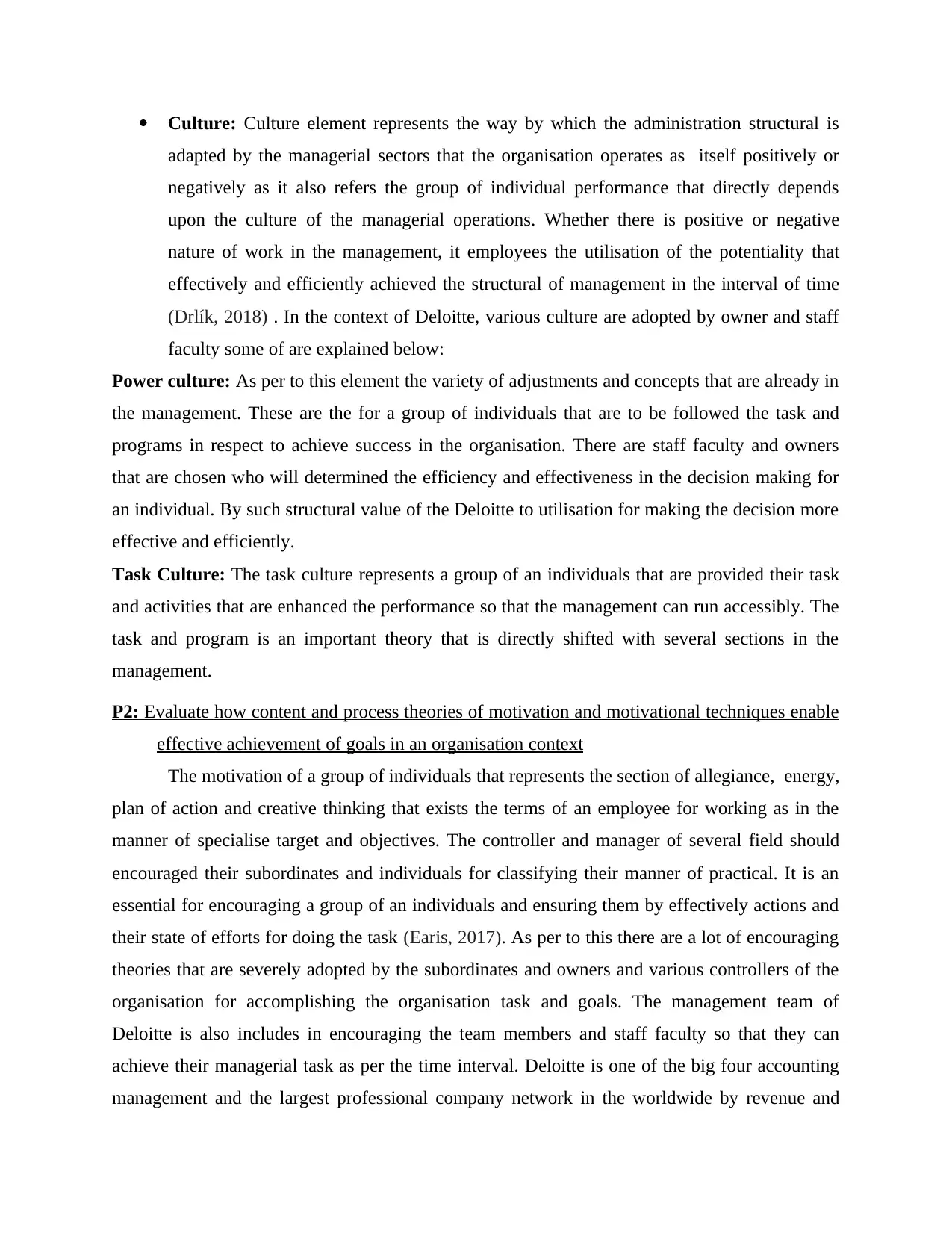
Culture: Culture element represents the way by which the administration structural is
adapted by the managerial sectors that the organisation operates as itself positively or
negatively as it also refers the group of individual performance that directly depends
upon the culture of the managerial operations. Whether there is positive or negative
nature of work in the management, it employees the utilisation of the potentiality that
effectively and efficiently achieved the structural of management in the interval of time
(Drlík, 2018) . In the context of Deloitte, various culture are adopted by owner and staff
faculty some of are explained below:
Power culture: As per to this element the variety of adjustments and concepts that are already in
the management. These are the for a group of individuals that are to be followed the task and
programs in respect to achieve success in the organisation. There are staff faculty and owners
that are chosen who will determined the efficiency and effectiveness in the decision making for
an individual. By such structural value of the Deloitte to utilisation for making the decision more
effective and efficiently.
Task Culture: The task culture represents a group of an individuals that are provided their task
and activities that are enhanced the performance so that the management can run accessibly. The
task and program is an important theory that is directly shifted with several sections in the
management.
P2: Evaluate how content and process theories of motivation and motivational techniques enable
effective achievement of goals in an organisation context
The motivation of a group of individuals that represents the section of allegiance, energy,
plan of action and creative thinking that exists the terms of an employee for working as in the
manner of specialise target and objectives. The controller and manager of several field should
encouraged their subordinates and individuals for classifying their manner of practical. It is an
essential for encouraging a group of an individuals and ensuring them by effectively actions and
their state of efforts for doing the task (Earis, 2017). As per to this there are a lot of encouraging
theories that are severely adopted by the subordinates and owners and various controllers of the
organisation for accomplishing the organisation task and goals. The management team of
Deloitte is also includes in encouraging the team members and staff faculty so that they can
achieve their managerial task as per the time interval. Deloitte is one of the big four accounting
management and the largest professional company network in the worldwide by revenue and
adapted by the managerial sectors that the organisation operates as itself positively or
negatively as it also refers the group of individual performance that directly depends
upon the culture of the managerial operations. Whether there is positive or negative
nature of work in the management, it employees the utilisation of the potentiality that
effectively and efficiently achieved the structural of management in the interval of time
(Drlík, 2018) . In the context of Deloitte, various culture are adopted by owner and staff
faculty some of are explained below:
Power culture: As per to this element the variety of adjustments and concepts that are already in
the management. These are the for a group of individuals that are to be followed the task and
programs in respect to achieve success in the organisation. There are staff faculty and owners
that are chosen who will determined the efficiency and effectiveness in the decision making for
an individual. By such structural value of the Deloitte to utilisation for making the decision more
effective and efficiently.
Task Culture: The task culture represents a group of an individuals that are provided their task
and activities that are enhanced the performance so that the management can run accessibly. The
task and program is an important theory that is directly shifted with several sections in the
management.
P2: Evaluate how content and process theories of motivation and motivational techniques enable
effective achievement of goals in an organisation context
The motivation of a group of individuals that represents the section of allegiance, energy,
plan of action and creative thinking that exists the terms of an employee for working as in the
manner of specialise target and objectives. The controller and manager of several field should
encouraged their subordinates and individuals for classifying their manner of practical. It is an
essential for encouraging a group of an individuals and ensuring them by effectively actions and
their state of efforts for doing the task (Earis, 2017). As per to this there are a lot of encouraging
theories that are severely adopted by the subordinates and owners and various controllers of the
organisation for accomplishing the organisation task and goals. The management team of
Deloitte is also includes in encouraging the team members and staff faculty so that they can
achieve their managerial task as per the time interval. Deloitte is one of the big four accounting
management and the largest professional company network in the worldwide by revenue and
⊘ This is a preview!⊘
Do you want full access?
Subscribe today to unlock all pages.

Trusted by 1+ million students worldwide
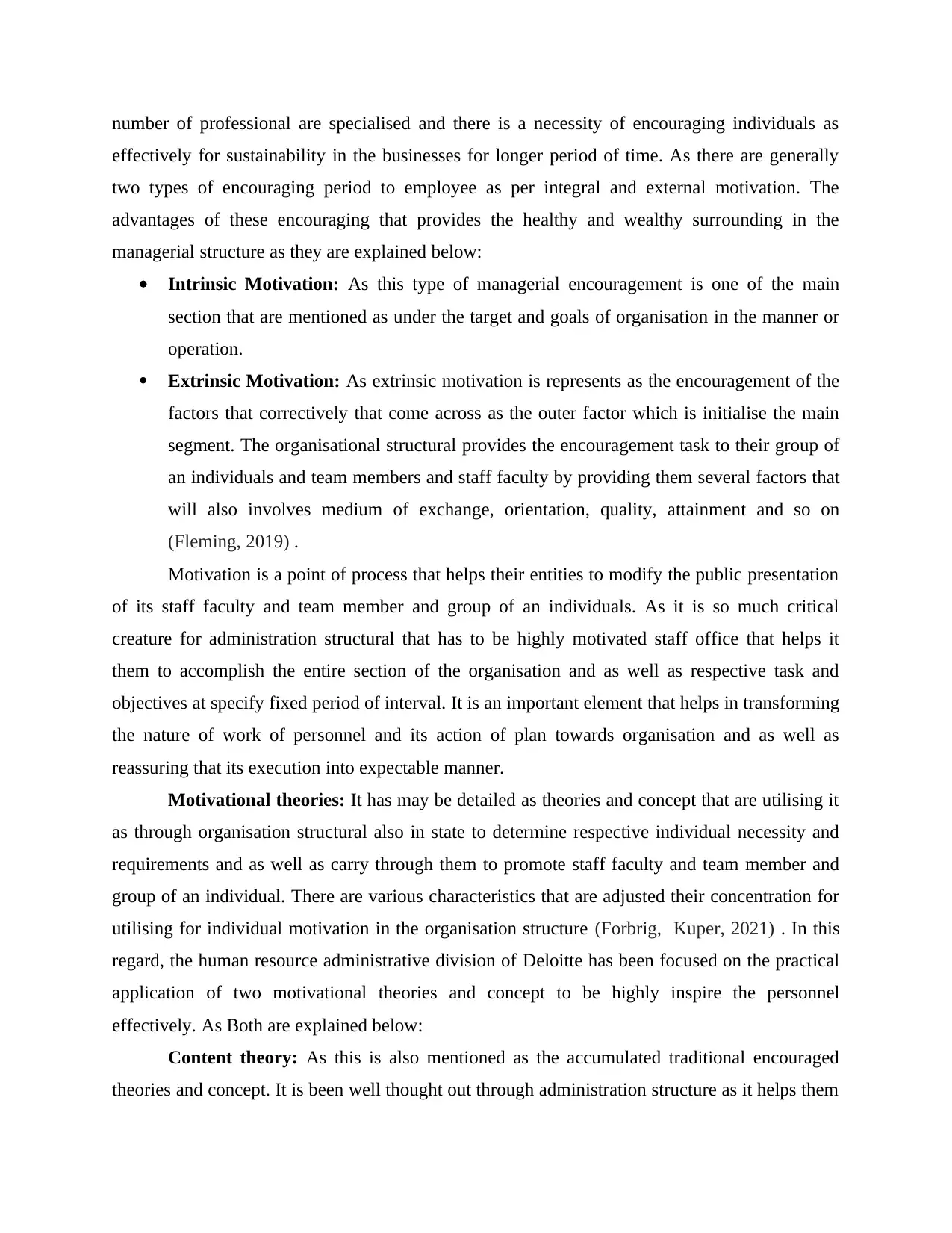
number of professional are specialised and there is a necessity of encouraging individuals as
effectively for sustainability in the businesses for longer period of time. As there are generally
two types of encouraging period to employee as per integral and external motivation. The
advantages of these encouraging that provides the healthy and wealthy surrounding in the
managerial structure as they are explained below:
Intrinsic Motivation: As this type of managerial encouragement is one of the main
section that are mentioned as under the target and goals of organisation in the manner or
operation.
Extrinsic Motivation: As extrinsic motivation is represents as the encouragement of the
factors that correctively that come across as the outer factor which is initialise the main
segment. The organisational structural provides the encouragement task to their group of
an individuals and team members and staff faculty by providing them several factors that
will also involves medium of exchange, orientation, quality, attainment and so on
(Fleming, 2019) .
Motivation is a point of process that helps their entities to modify the public presentation
of its staff faculty and team member and group of an individuals. As it is so much critical
creature for administration structural that has to be highly motivated staff office that helps it
them to accomplish the entire section of the organisation and as well as respective task and
objectives at specify fixed period of interval. It is an important element that helps in transforming
the nature of work of personnel and its action of plan towards organisation and as well as
reassuring that its execution into expectable manner.
Motivational theories: It has may be detailed as theories and concept that are utilising it
as through organisation structural also in state to determine respective individual necessity and
requirements and as well as carry through them to promote staff faculty and team member and
group of an individual. There are various characteristics that are adjusted their concentration for
utilising for individual motivation in the organisation structure (Forbrig, Kuper, 2021) . In this
regard, the human resource administrative division of Deloitte has been focused on the practical
application of two motivational theories and concept to be highly inspire the personnel
effectively. As Both are explained below:
Content theory: As this is also mentioned as the accumulated traditional encouraged
theories and concept. It is been well thought out through administration structure as it helps them
effectively for sustainability in the businesses for longer period of time. As there are generally
two types of encouraging period to employee as per integral and external motivation. The
advantages of these encouraging that provides the healthy and wealthy surrounding in the
managerial structure as they are explained below:
Intrinsic Motivation: As this type of managerial encouragement is one of the main
section that are mentioned as under the target and goals of organisation in the manner or
operation.
Extrinsic Motivation: As extrinsic motivation is represents as the encouragement of the
factors that correctively that come across as the outer factor which is initialise the main
segment. The organisational structural provides the encouragement task to their group of
an individuals and team members and staff faculty by providing them several factors that
will also involves medium of exchange, orientation, quality, attainment and so on
(Fleming, 2019) .
Motivation is a point of process that helps their entities to modify the public presentation
of its staff faculty and team member and group of an individuals. As it is so much critical
creature for administration structural that has to be highly motivated staff office that helps it
them to accomplish the entire section of the organisation and as well as respective task and
objectives at specify fixed period of interval. It is an important element that helps in transforming
the nature of work of personnel and its action of plan towards organisation and as well as
reassuring that its execution into expectable manner.
Motivational theories: It has may be detailed as theories and concept that are utilising it
as through organisation structural also in state to determine respective individual necessity and
requirements and as well as carry through them to promote staff faculty and team member and
group of an individual. There are various characteristics that are adjusted their concentration for
utilising for individual motivation in the organisation structure (Forbrig, Kuper, 2021) . In this
regard, the human resource administrative division of Deloitte has been focused on the practical
application of two motivational theories and concept to be highly inspire the personnel
effectively. As Both are explained below:
Content theory: As this is also mentioned as the accumulated traditional encouraged
theories and concept. It is been well thought out through administration structure as it helps them
Paraphrase This Document
Need a fresh take? Get an instant paraphrase of this document with our AI Paraphraser
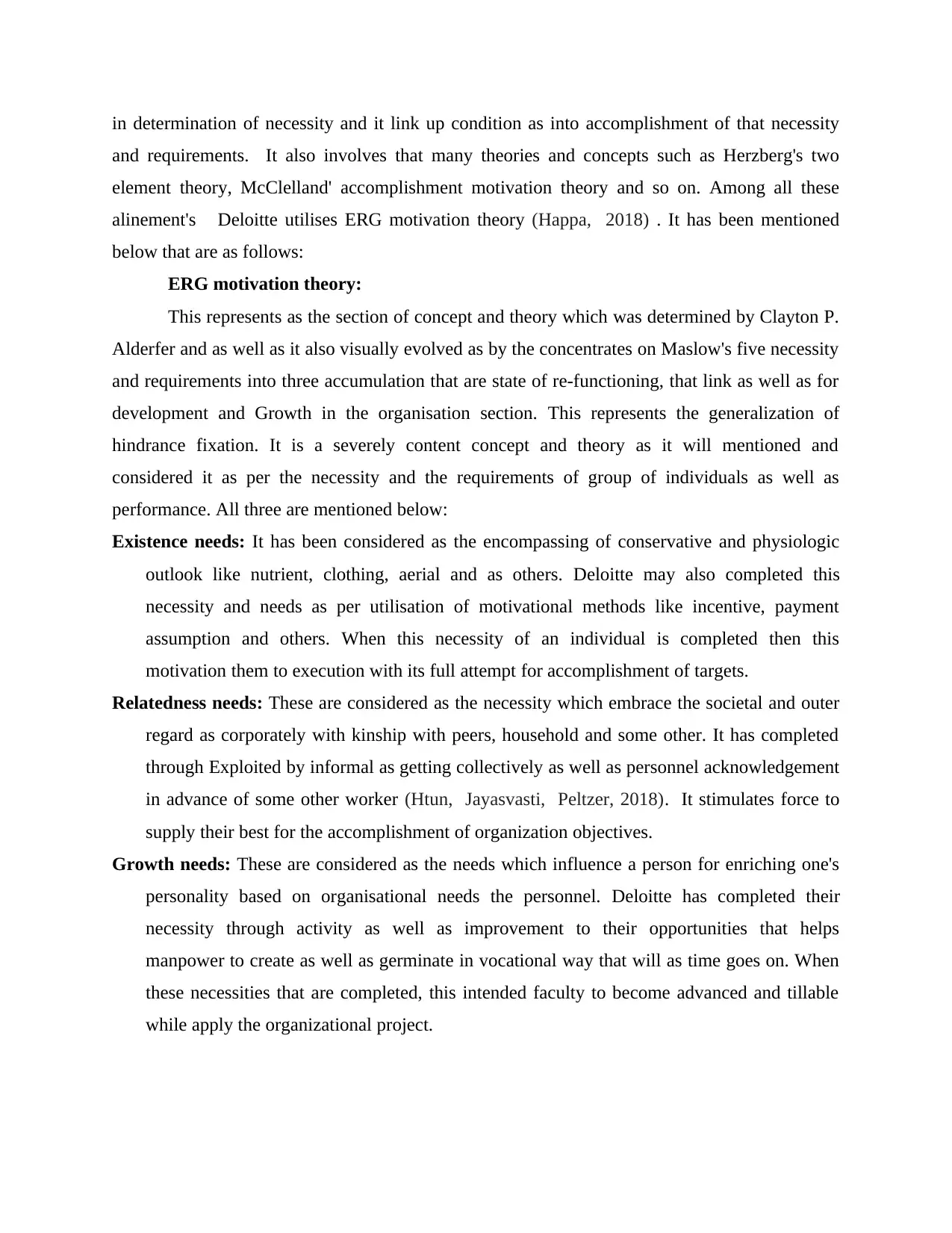
in determination of necessity and it link up condition as into accomplishment of that necessity
and requirements. It also involves that many theories and concepts such as Herzberg's two
element theory, McClelland' accomplishment motivation theory and so on. Among all these
alinement's Deloitte utilises ERG motivation theory (Happa, 2018) . It has been mentioned
below that are as follows:
ERG motivation theory:
This represents as the section of concept and theory which was determined by Clayton P.
Alderfer and as well as it also visually evolved as by the concentrates on Maslow's five necessity
and requirements into three accumulation that are state of re-functioning, that link as well as for
development and Growth in the organisation section. This represents the generalization of
hindrance fixation. It is a severely content concept and theory as it will mentioned and
considered it as per the necessity and the requirements of group of individuals as well as
performance. All three are mentioned below:
Existence needs: It has been considered as the encompassing of conservative and physiologic
outlook like nutrient, clothing, aerial and as others. Deloitte may also completed this
necessity and needs as per utilisation of motivational methods like incentive, payment
assumption and others. When this necessity of an individual is completed then this
motivation them to execution with its full attempt for accomplishment of targets.
Relatedness needs: These are considered as the necessity which embrace the societal and outer
regard as corporately with kinship with peers, household and some other. It has completed
through Exploited by informal as getting collectively as well as personnel acknowledgement
in advance of some other worker (Htun, Jayasvasti, Peltzer, 2018). It stimulates force to
supply their best for the accomplishment of organization objectives.
Growth needs: These are considered as the needs which influence a person for enriching one's
personality based on organisational needs the personnel. Deloitte has completed their
necessity through activity as well as improvement to their opportunities that helps
manpower to create as well as germinate in vocational way that will as time goes on. When
these necessities that are completed, this intended faculty to become advanced and tillable
while apply the organizational project.
and requirements. It also involves that many theories and concepts such as Herzberg's two
element theory, McClelland' accomplishment motivation theory and so on. Among all these
alinement's Deloitte utilises ERG motivation theory (Happa, 2018) . It has been mentioned
below that are as follows:
ERG motivation theory:
This represents as the section of concept and theory which was determined by Clayton P.
Alderfer and as well as it also visually evolved as by the concentrates on Maslow's five necessity
and requirements into three accumulation that are state of re-functioning, that link as well as for
development and Growth in the organisation section. This represents the generalization of
hindrance fixation. It is a severely content concept and theory as it will mentioned and
considered it as per the necessity and the requirements of group of individuals as well as
performance. All three are mentioned below:
Existence needs: It has been considered as the encompassing of conservative and physiologic
outlook like nutrient, clothing, aerial and as others. Deloitte may also completed this
necessity and needs as per utilisation of motivational methods like incentive, payment
assumption and others. When this necessity of an individual is completed then this
motivation them to execution with its full attempt for accomplishment of targets.
Relatedness needs: These are considered as the necessity which embrace the societal and outer
regard as corporately with kinship with peers, household and some other. It has completed
through Exploited by informal as getting collectively as well as personnel acknowledgement
in advance of some other worker (Htun, Jayasvasti, Peltzer, 2018). It stimulates force to
supply their best for the accomplishment of organization objectives.
Growth needs: These are considered as the needs which influence a person for enriching one's
personality based on organisational needs the personnel. Deloitte has completed their
necessity through activity as well as improvement to their opportunities that helps
manpower to create as well as germinate in vocational way that will as time goes on. When
these necessities that are completed, this intended faculty to become advanced and tillable
while apply the organizational project.
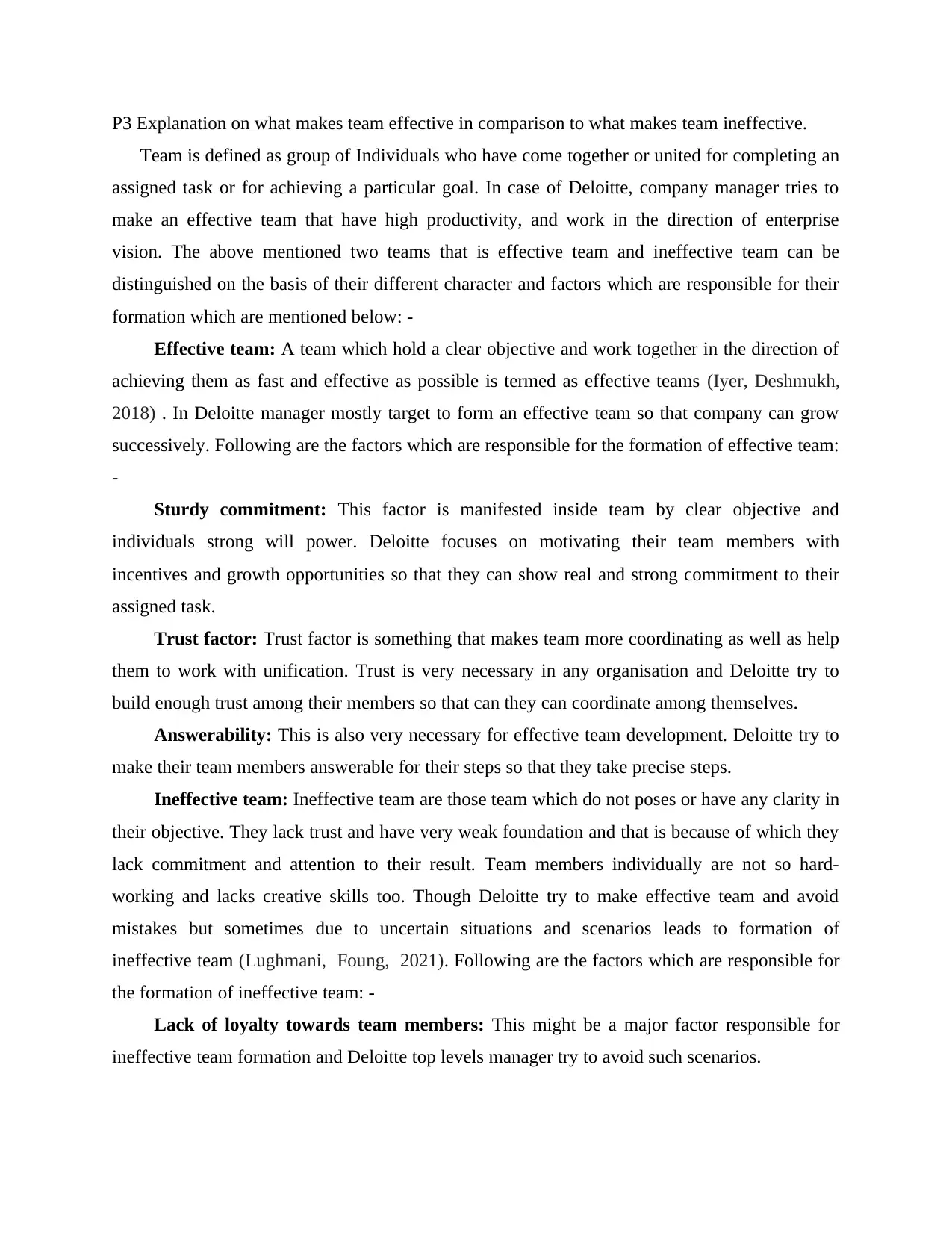
P3 Explanation on what makes team effective in comparison to what makes team ineffective.
Team is defined as group of Individuals who have come together or united for completing an
assigned task or for achieving a particular goal. In case of Deloitte, company manager tries to
make an effective team that have high productivity, and work in the direction of enterprise
vision. The above mentioned two teams that is effective team and ineffective team can be
distinguished on the basis of their different character and factors which are responsible for their
formation which are mentioned below: -
Effective team: A team which hold a clear objective and work together in the direction of
achieving them as fast and effective as possible is termed as effective teams (Iyer, Deshmukh,
2018) . In Deloitte manager mostly target to form an effective team so that company can grow
successively. Following are the factors which are responsible for the formation of effective team:
-
Sturdy commitment: This factor is manifested inside team by clear objective and
individuals strong will power. Deloitte focuses on motivating their team members with
incentives and growth opportunities so that they can show real and strong commitment to their
assigned task.
Trust factor: Trust factor is something that makes team more coordinating as well as help
them to work with unification. Trust is very necessary in any organisation and Deloitte try to
build enough trust among their members so that can they can coordinate among themselves.
Answerability: This is also very necessary for effective team development. Deloitte try to
make their team members answerable for their steps so that they take precise steps.
Ineffective team: Ineffective team are those team which do not poses or have any clarity in
their objective. They lack trust and have very weak foundation and that is because of which they
lack commitment and attention to their result. Team members individually are not so hard-
working and lacks creative skills too. Though Deloitte try to make effective team and avoid
mistakes but sometimes due to uncertain situations and scenarios leads to formation of
ineffective team (Lughmani, Foung, 2021). Following are the factors which are responsible for
the formation of ineffective team: -
Lack of loyalty towards team members: This might be a major factor responsible for
ineffective team formation and Deloitte top levels manager try to avoid such scenarios.
Team is defined as group of Individuals who have come together or united for completing an
assigned task or for achieving a particular goal. In case of Deloitte, company manager tries to
make an effective team that have high productivity, and work in the direction of enterprise
vision. The above mentioned two teams that is effective team and ineffective team can be
distinguished on the basis of their different character and factors which are responsible for their
formation which are mentioned below: -
Effective team: A team which hold a clear objective and work together in the direction of
achieving them as fast and effective as possible is termed as effective teams (Iyer, Deshmukh,
2018) . In Deloitte manager mostly target to form an effective team so that company can grow
successively. Following are the factors which are responsible for the formation of effective team:
-
Sturdy commitment: This factor is manifested inside team by clear objective and
individuals strong will power. Deloitte focuses on motivating their team members with
incentives and growth opportunities so that they can show real and strong commitment to their
assigned task.
Trust factor: Trust factor is something that makes team more coordinating as well as help
them to work with unification. Trust is very necessary in any organisation and Deloitte try to
build enough trust among their members so that can they can coordinate among themselves.
Answerability: This is also very necessary for effective team development. Deloitte try to
make their team members answerable for their steps so that they take precise steps.
Ineffective team: Ineffective team are those team which do not poses or have any clarity in
their objective. They lack trust and have very weak foundation and that is because of which they
lack commitment and attention to their result. Team members individually are not so hard-
working and lacks creative skills too. Though Deloitte try to make effective team and avoid
mistakes but sometimes due to uncertain situations and scenarios leads to formation of
ineffective team (Lughmani, Foung, 2021). Following are the factors which are responsible for
the formation of ineffective team: -
Lack of loyalty towards team members: This might be a major factor responsible for
ineffective team formation and Deloitte top levels manager try to avoid such scenarios.
⊘ This is a preview!⊘
Do you want full access?
Subscribe today to unlock all pages.

Trusted by 1+ million students worldwide
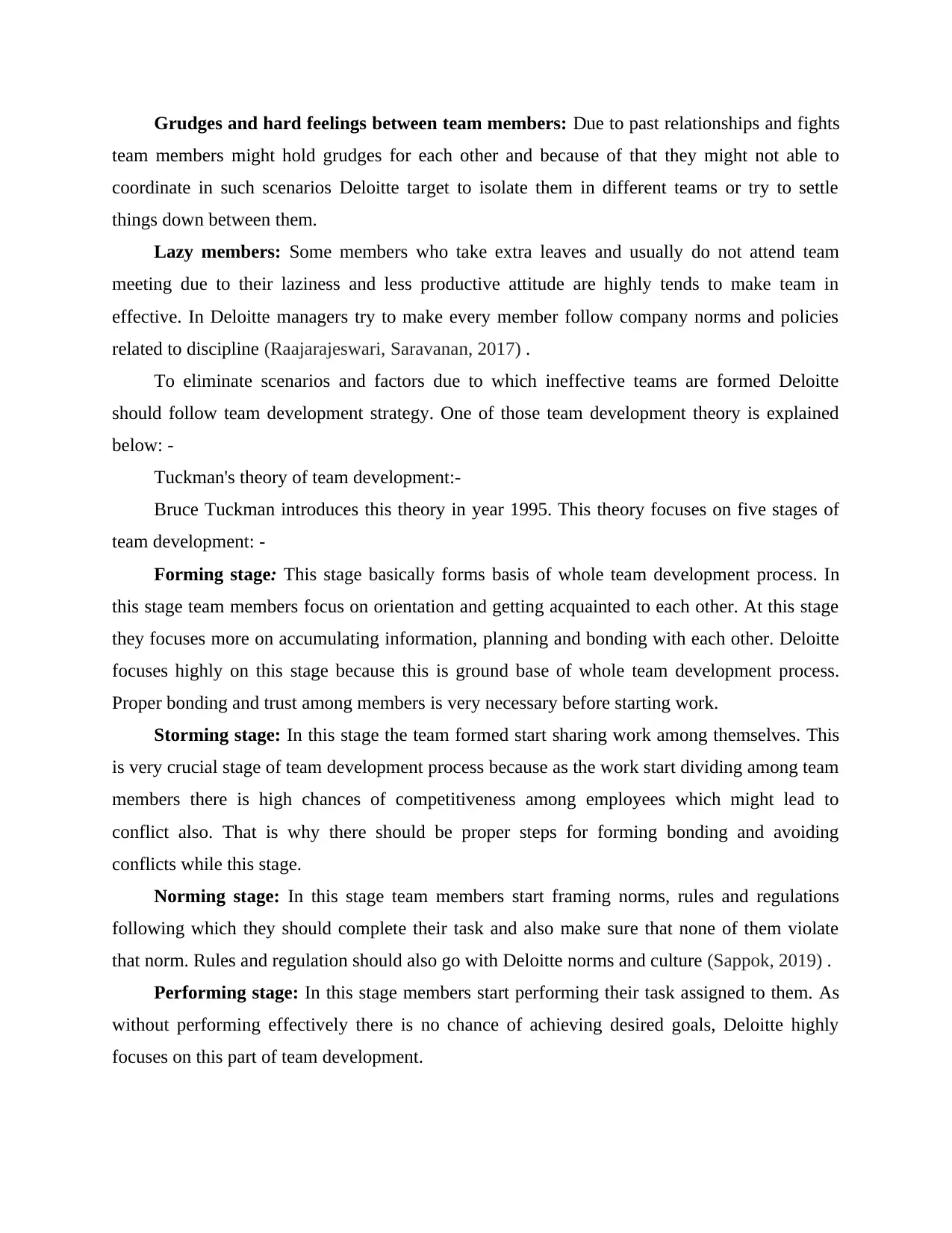
Grudges and hard feelings between team members: Due to past relationships and fights
team members might hold grudges for each other and because of that they might not able to
coordinate in such scenarios Deloitte target to isolate them in different teams or try to settle
things down between them.
Lazy members: Some members who take extra leaves and usually do not attend team
meeting due to their laziness and less productive attitude are highly tends to make team in
effective. In Deloitte managers try to make every member follow company norms and policies
related to discipline (Raajarajeswari, Saravanan, 2017) .
To eliminate scenarios and factors due to which ineffective teams are formed Deloitte
should follow team development strategy. One of those team development theory is explained
below: -
Tuckman's theory of team development:-
Bruce Tuckman introduces this theory in year 1995. This theory focuses on five stages of
team development: -
Forming stage: This stage basically forms basis of whole team development process. In
this stage team members focus on orientation and getting acquainted to each other. At this stage
they focuses more on accumulating information, planning and bonding with each other. Deloitte
focuses highly on this stage because this is ground base of whole team development process.
Proper bonding and trust among members is very necessary before starting work.
Storming stage: In this stage the team formed start sharing work among themselves. This
is very crucial stage of team development process because as the work start dividing among team
members there is high chances of competitiveness among employees which might lead to
conflict also. That is why there should be proper steps for forming bonding and avoiding
conflicts while this stage.
Norming stage: In this stage team members start framing norms, rules and regulations
following which they should complete their task and also make sure that none of them violate
that norm. Rules and regulation should also go with Deloitte norms and culture (Sappok, 2019) .
Performing stage: In this stage members start performing their task assigned to them. As
without performing effectively there is no chance of achieving desired goals, Deloitte highly
focuses on this part of team development.
team members might hold grudges for each other and because of that they might not able to
coordinate in such scenarios Deloitte target to isolate them in different teams or try to settle
things down between them.
Lazy members: Some members who take extra leaves and usually do not attend team
meeting due to their laziness and less productive attitude are highly tends to make team in
effective. In Deloitte managers try to make every member follow company norms and policies
related to discipline (Raajarajeswari, Saravanan, 2017) .
To eliminate scenarios and factors due to which ineffective teams are formed Deloitte
should follow team development strategy. One of those team development theory is explained
below: -
Tuckman's theory of team development:-
Bruce Tuckman introduces this theory in year 1995. This theory focuses on five stages of
team development: -
Forming stage: This stage basically forms basis of whole team development process. In
this stage team members focus on orientation and getting acquainted to each other. At this stage
they focuses more on accumulating information, planning and bonding with each other. Deloitte
focuses highly on this stage because this is ground base of whole team development process.
Proper bonding and trust among members is very necessary before starting work.
Storming stage: In this stage the team formed start sharing work among themselves. This
is very crucial stage of team development process because as the work start dividing among team
members there is high chances of competitiveness among employees which might lead to
conflict also. That is why there should be proper steps for forming bonding and avoiding
conflicts while this stage.
Norming stage: In this stage team members start framing norms, rules and regulations
following which they should complete their task and also make sure that none of them violate
that norm. Rules and regulation should also go with Deloitte norms and culture (Sappok, 2019) .
Performing stage: In this stage members start performing their task assigned to them. As
without performing effectively there is no chance of achieving desired goals, Deloitte highly
focuses on this part of team development.
Paraphrase This Document
Need a fresh take? Get an instant paraphrase of this document with our AI Paraphraser
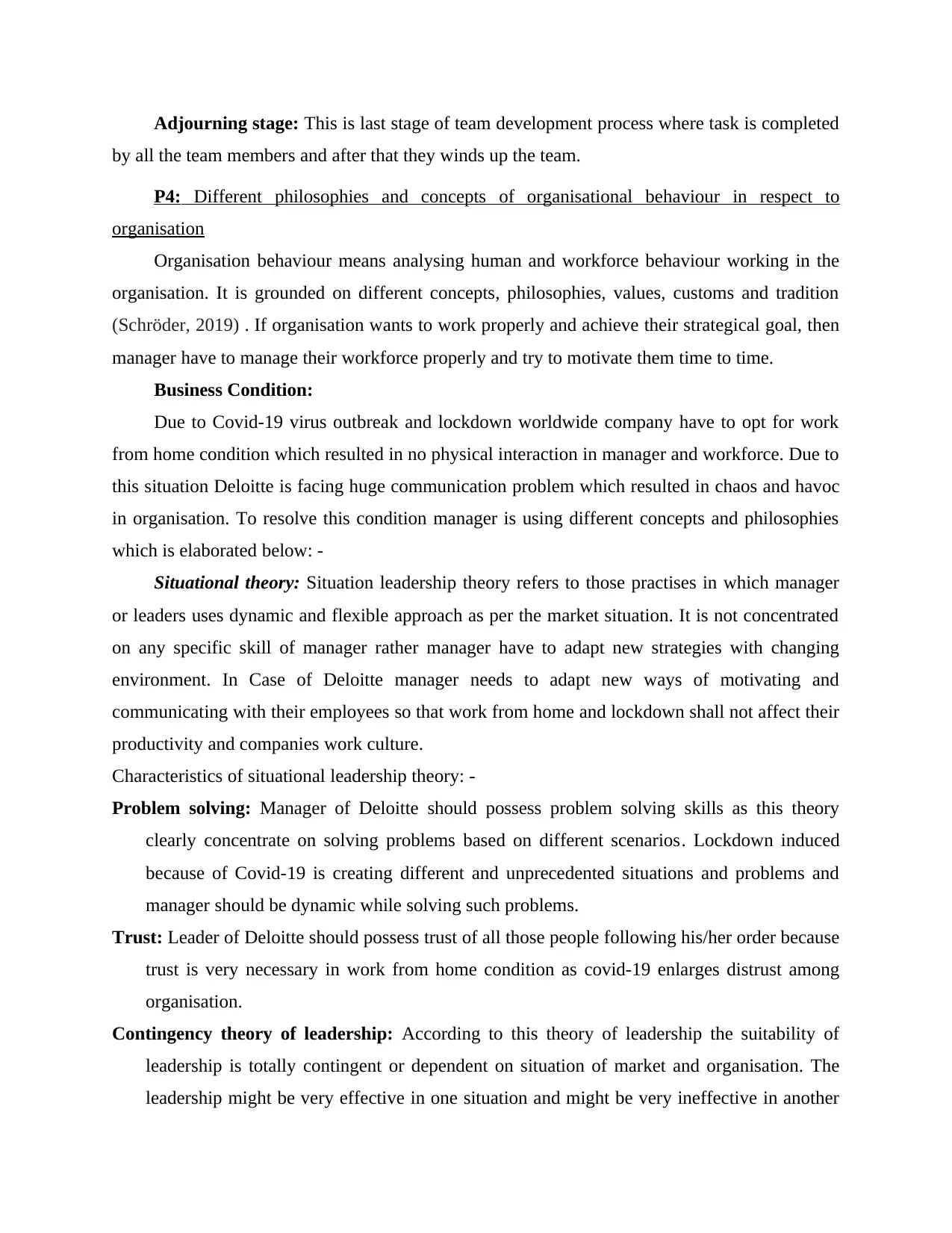
Adjourning stage: This is last stage of team development process where task is completed
by all the team members and after that they winds up the team.
P4: Different philosophies and concepts of organisational behaviour in respect to
organisation
Organisation behaviour means analysing human and workforce behaviour working in the
organisation. It is grounded on different concepts, philosophies, values, customs and tradition
(Schröder, 2019) . If organisation wants to work properly and achieve their strategical goal, then
manager have to manage their workforce properly and try to motivate them time to time.
Business Condition:
Due to Covid-19 virus outbreak and lockdown worldwide company have to opt for work
from home condition which resulted in no physical interaction in manager and workforce. Due to
this situation Deloitte is facing huge communication problem which resulted in chaos and havoc
in organisation. To resolve this condition manager is using different concepts and philosophies
which is elaborated below: -
Situational theory: Situation leadership theory refers to those practises in which manager
or leaders uses dynamic and flexible approach as per the market situation. It is not concentrated
on any specific skill of manager rather manager have to adapt new strategies with changing
environment. In Case of Deloitte manager needs to adapt new ways of motivating and
communicating with their employees so that work from home and lockdown shall not affect their
productivity and companies work culture.
Characteristics of situational leadership theory: -
Problem solving: Manager of Deloitte should possess problem solving skills as this theory
clearly concentrate on solving problems based on different scenarios. Lockdown induced
because of Covid-19 is creating different and unprecedented situations and problems and
manager should be dynamic while solving such problems.
Trust: Leader of Deloitte should possess trust of all those people following his/her order because
trust is very necessary in work from home condition as covid-19 enlarges distrust among
organisation.
Contingency theory of leadership: According to this theory of leadership the suitability of
leadership is totally contingent or dependent on situation of market and organisation. The
leadership might be very effective in one situation and might be very ineffective in another
by all the team members and after that they winds up the team.
P4: Different philosophies and concepts of organisational behaviour in respect to
organisation
Organisation behaviour means analysing human and workforce behaviour working in the
organisation. It is grounded on different concepts, philosophies, values, customs and tradition
(Schröder, 2019) . If organisation wants to work properly and achieve their strategical goal, then
manager have to manage their workforce properly and try to motivate them time to time.
Business Condition:
Due to Covid-19 virus outbreak and lockdown worldwide company have to opt for work
from home condition which resulted in no physical interaction in manager and workforce. Due to
this situation Deloitte is facing huge communication problem which resulted in chaos and havoc
in organisation. To resolve this condition manager is using different concepts and philosophies
which is elaborated below: -
Situational theory: Situation leadership theory refers to those practises in which manager
or leaders uses dynamic and flexible approach as per the market situation. It is not concentrated
on any specific skill of manager rather manager have to adapt new strategies with changing
environment. In Case of Deloitte manager needs to adapt new ways of motivating and
communicating with their employees so that work from home and lockdown shall not affect their
productivity and companies work culture.
Characteristics of situational leadership theory: -
Problem solving: Manager of Deloitte should possess problem solving skills as this theory
clearly concentrate on solving problems based on different scenarios. Lockdown induced
because of Covid-19 is creating different and unprecedented situations and problems and
manager should be dynamic while solving such problems.
Trust: Leader of Deloitte should possess trust of all those people following his/her order because
trust is very necessary in work from home condition as covid-19 enlarges distrust among
organisation.
Contingency theory of leadership: According to this theory of leadership the suitability of
leadership is totally contingent or dependent on situation of market and organisation. The
leadership might be very effective in one situation and might be very ineffective in another
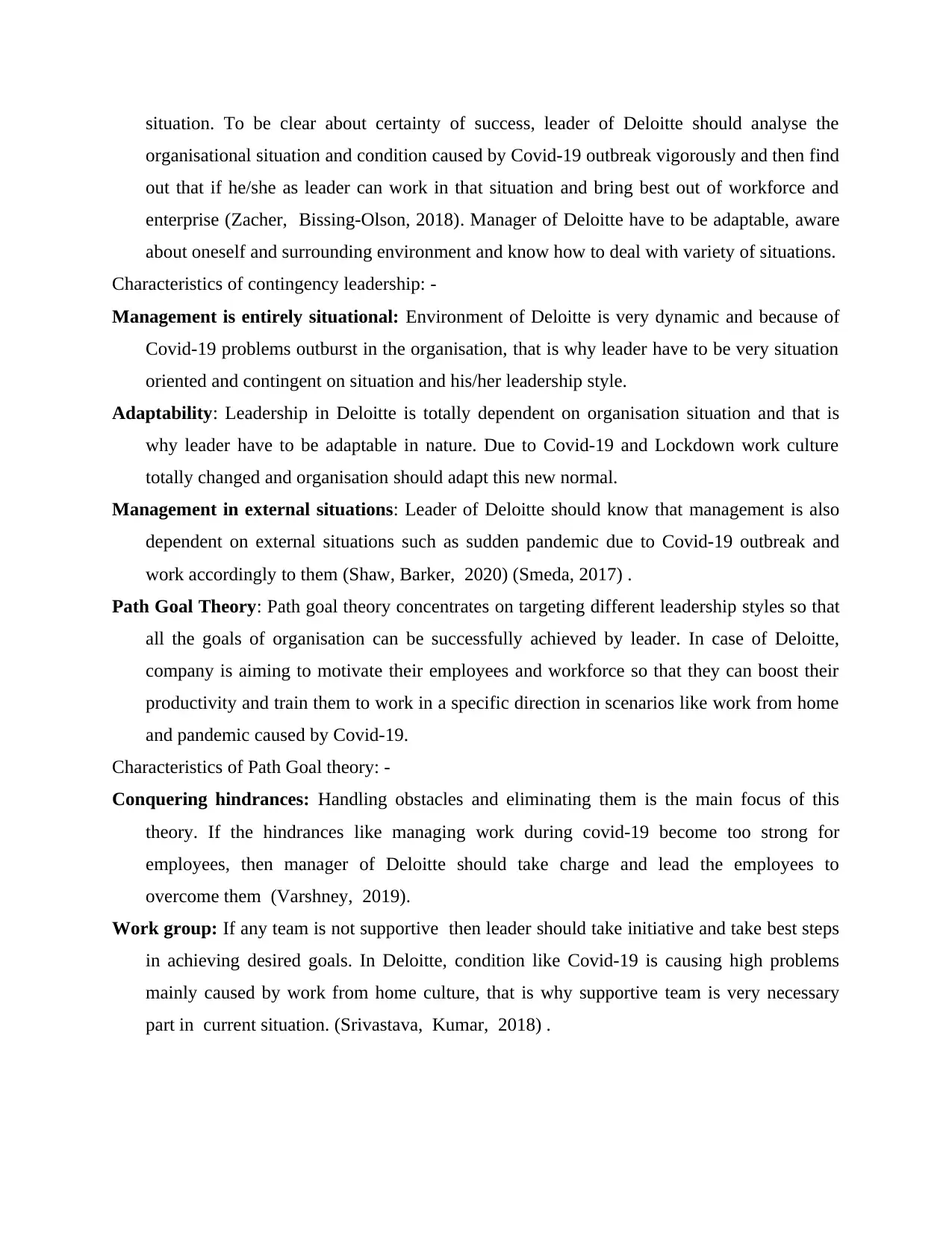
situation. To be clear about certainty of success, leader of Deloitte should analyse the
organisational situation and condition caused by Covid-19 outbreak vigorously and then find
out that if he/she as leader can work in that situation and bring best out of workforce and
enterprise (Zacher, Bissing-Olson, 2018). Manager of Deloitte have to be adaptable, aware
about oneself and surrounding environment and know how to deal with variety of situations.
Characteristics of contingency leadership: -
Management is entirely situational: Environment of Deloitte is very dynamic and because of
Covid-19 problems outburst in the organisation, that is why leader have to be very situation
oriented and contingent on situation and his/her leadership style.
Adaptability: Leadership in Deloitte is totally dependent on organisation situation and that is
why leader have to be adaptable in nature. Due to Covid-19 and Lockdown work culture
totally changed and organisation should adapt this new normal.
Management in external situations: Leader of Deloitte should know that management is also
dependent on external situations such as sudden pandemic due to Covid-19 outbreak and
work accordingly to them (Shaw, Barker, 2020) (Smeda, 2017) .
Path Goal Theory: Path goal theory concentrates on targeting different leadership styles so that
all the goals of organisation can be successfully achieved by leader. In case of Deloitte,
company is aiming to motivate their employees and workforce so that they can boost their
productivity and train them to work in a specific direction in scenarios like work from home
and pandemic caused by Covid-19.
Characteristics of Path Goal theory: -
Conquering hindrances: Handling obstacles and eliminating them is the main focus of this
theory. If the hindrances like managing work during covid-19 become too strong for
employees, then manager of Deloitte should take charge and lead the employees to
overcome them (Varshney, 2019).
Work group: If any team is not supportive then leader should take initiative and take best steps
in achieving desired goals. In Deloitte, condition like Covid-19 is causing high problems
mainly caused by work from home culture, that is why supportive team is very necessary
part in current situation. (Srivastava, Kumar, 2018) .
organisational situation and condition caused by Covid-19 outbreak vigorously and then find
out that if he/she as leader can work in that situation and bring best out of workforce and
enterprise (Zacher, Bissing-Olson, 2018). Manager of Deloitte have to be adaptable, aware
about oneself and surrounding environment and know how to deal with variety of situations.
Characteristics of contingency leadership: -
Management is entirely situational: Environment of Deloitte is very dynamic and because of
Covid-19 problems outburst in the organisation, that is why leader have to be very situation
oriented and contingent on situation and his/her leadership style.
Adaptability: Leadership in Deloitte is totally dependent on organisation situation and that is
why leader have to be adaptable in nature. Due to Covid-19 and Lockdown work culture
totally changed and organisation should adapt this new normal.
Management in external situations: Leader of Deloitte should know that management is also
dependent on external situations such as sudden pandemic due to Covid-19 outbreak and
work accordingly to them (Shaw, Barker, 2020) (Smeda, 2017) .
Path Goal Theory: Path goal theory concentrates on targeting different leadership styles so that
all the goals of organisation can be successfully achieved by leader. In case of Deloitte,
company is aiming to motivate their employees and workforce so that they can boost their
productivity and train them to work in a specific direction in scenarios like work from home
and pandemic caused by Covid-19.
Characteristics of Path Goal theory: -
Conquering hindrances: Handling obstacles and eliminating them is the main focus of this
theory. If the hindrances like managing work during covid-19 become too strong for
employees, then manager of Deloitte should take charge and lead the employees to
overcome them (Varshney, 2019).
Work group: If any team is not supportive then leader should take initiative and take best steps
in achieving desired goals. In Deloitte, condition like Covid-19 is causing high problems
mainly caused by work from home culture, that is why supportive team is very necessary
part in current situation. (Srivastava, Kumar, 2018) .
⊘ This is a preview!⊘
Do you want full access?
Subscribe today to unlock all pages.

Trusted by 1+ million students worldwide
1 out of 17
Related Documents
Your All-in-One AI-Powered Toolkit for Academic Success.
+13062052269
info@desklib.com
Available 24*7 on WhatsApp / Email
![[object Object]](/_next/static/media/star-bottom.7253800d.svg)
Unlock your academic potential
Copyright © 2020–2026 A2Z Services. All Rights Reserved. Developed and managed by ZUCOL.


